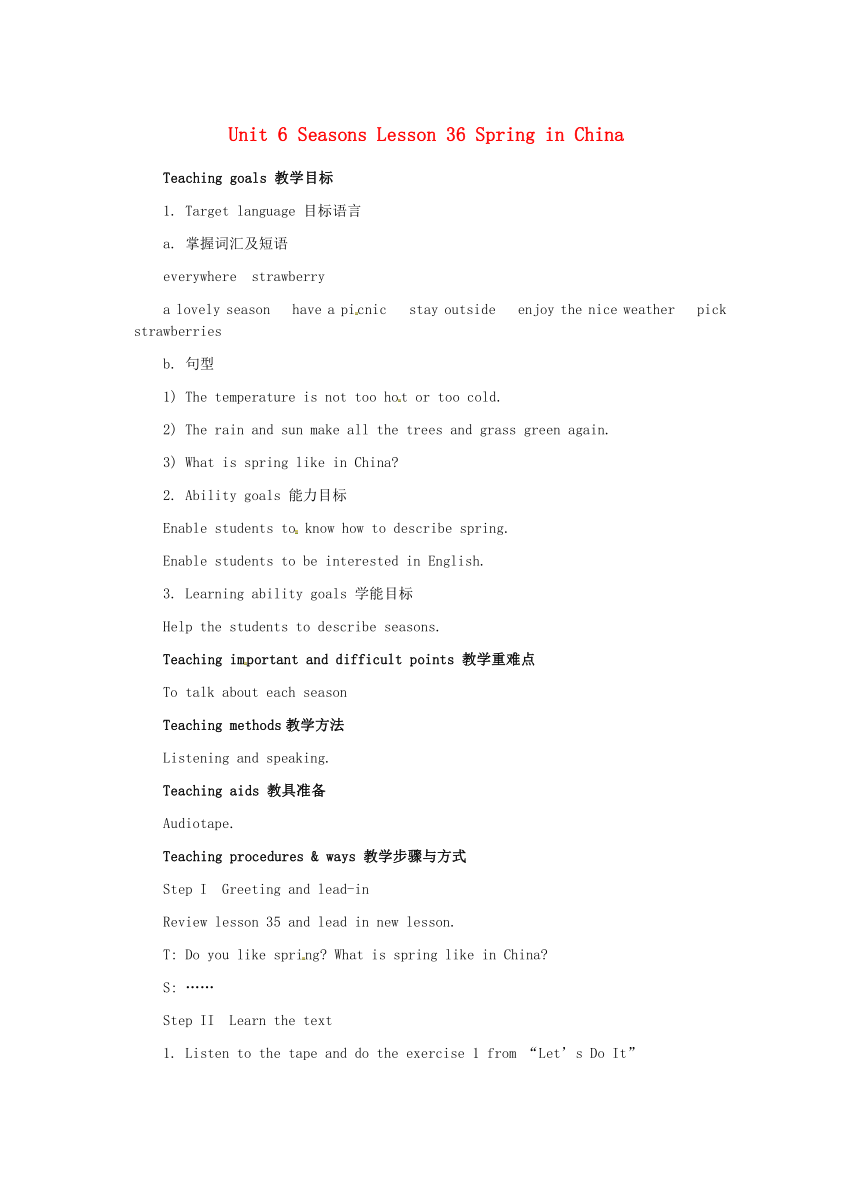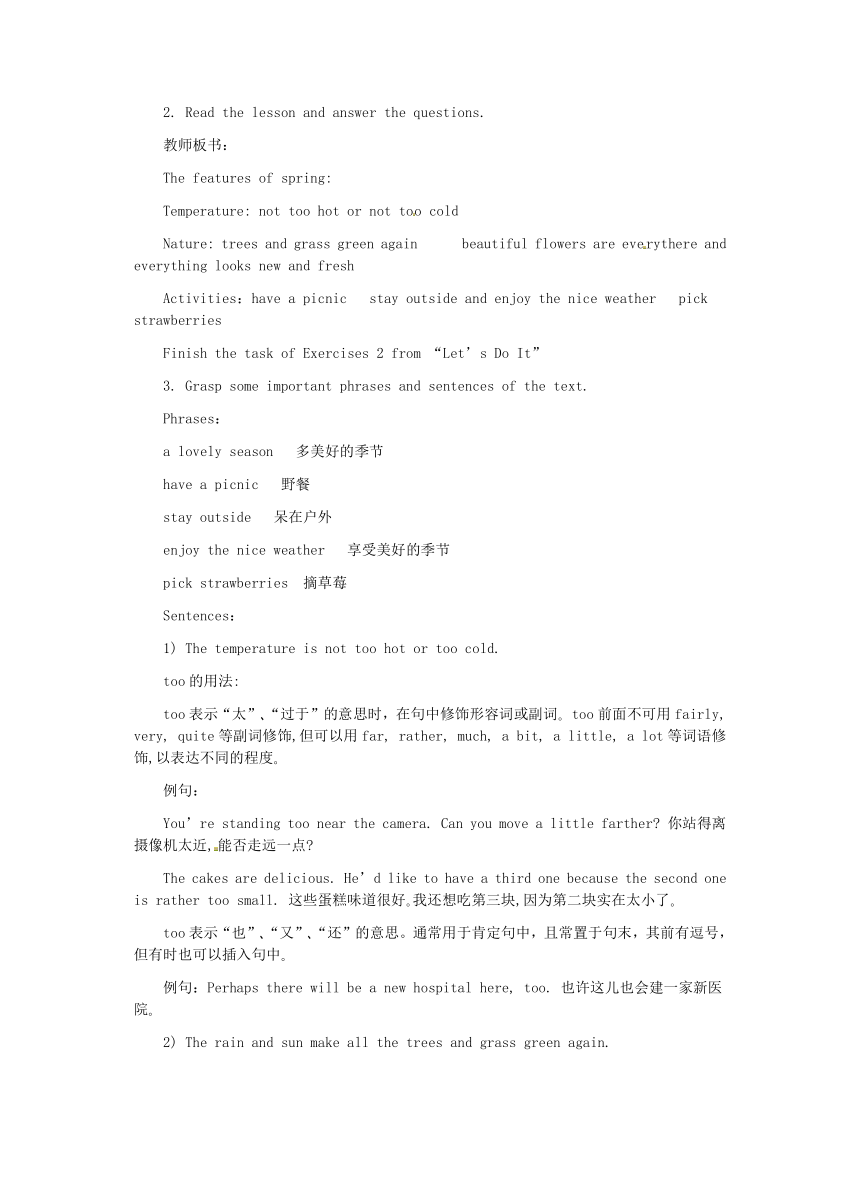Unit 6 Seasons Lesson 36 Spring in China教案
文档属性
| 名称 | Unit 6 Seasons Lesson 36 Spring in China教案 |

|
|
| 格式 | doc | ||
| 文件大小 | 94.0KB | ||
| 资源类型 | 教案 | ||
| 版本资源 | 冀教版 | ||
| 科目 | 英语 | ||
| 更新时间 | 2022-04-16 08:45:57 | ||
图片预览


文档简介
Unit 6 Seasons Lesson 36 Spring in China
Teaching goals 教学目标
1. Target language 目标语言
a. 掌握词汇及短语
everywhere strawberry
a lovely season have a picnic stay outside enjoy the nice weather pick strawberries
b. 句型
1) The temperature is not too hot or too cold.
2) The rain and sun make all the trees and grass green again.
3) What is spring like in China
2. Ability goals 能力目标
Enable students to know how to describe spring.
Enable students to be interested in English.
3. Learning ability goals 学能目标
Help the students to describe seasons.
Teaching important and difficult points 教学重难点
To talk about each season
Teaching methods教学方法
Listening and speaking.
Teaching aids 教具准备
Audiotape.
Teaching procedures & ways 教学步骤与方式
Step I Greeting and lead-in
Review lesson 35 and lead in new lesson.
T: Do you like spring What is spring like in China
S: ……
Step II Learn the text
1. Listen to the tape and do the exercise 1 from “Let’s Do It”
2. Read the lesson and answer the questions.
教师板书:
The features of spring:
Temperature: not too hot or not too cold
Nature: trees and grass green again beautiful flowers are everythere and everything looks new and fresh
Activities:have a picnic stay outside and enjoy the nice weather pick strawberries
Finish the task of Exercises 2 from “Let’s Do It”
3. Grasp some important phrases and sentences of the text.
Phrases:
a lovely season 多美好的季节
have a picnic 野餐
stay outside 呆在户外
enjoy the nice weather 享受美好的季节
pick strawberries 摘草莓
Sentences:
1) The temperature is not too hot or too cold.
too的用法:
too表示“太” “过于”的意思时,在句中修饰形容词或副词 too前面不可用fairly, very, quite等副词修饰,但可以用far, rather, much, a bit, a little, a lot等词语修饰,以表达不同的程度
例句:
You’re standing too near the camera. Can you move a little farther 你站得离摄像机太近,能否走远一点
The cakes are delicious. He’d like to have a third one because the second one is rather too small. 这些蛋糕味道很好 我还想吃第三块,因为第二块实在太小了
too表示“也” “又” “还”的意思。通常用于肯定句中,且常置于句末,其前有逗号,但有时也可以插入句中
例句:Perhaps there will be a new hospital here, too. 也许这儿也会建一家新医院
2) The rain and sun make all the trees and grass green again.
make 用法:
make作为及物动词,有一种特殊用法,即“使役用法”,在表示“使(要)某人(事物)做什么(怎么样)”时,它除了要有一个“宾语”之外,还要求宾语后面带上一个宾语补足语,整个句子才能完整,这种“宾语+宾语补足语”是英语简单句的五种基本句型之一,同学们一定要掌握好。
可作宾语补足语的词或词组有:
①动词原形,即不带to的动词不定式
例句:He made me stay with him. 让我和他在一起。
How did Ling Feng make the baby stop crying 凌风是怎样使婴儿停止啼哭的?
②形容词(词组)
例句:This made all the street as light as day. 这使整条街道亮如白昼。
He tried to make them happy. 他设法使他们高兴。
It'll made me so happy. 这件事可使我如此高兴。
③名词(词组)
例句:I would make you king over the earth.我会让你做国王统治世界。
He made her his wife.他娶她为妻。
All work and no play makes Jack a dull boy.只有工作没有娱乐使杰克脑子极为迟钝。(只工作不学习,聪明的孩子也变傻)。
④有时可用介词短语。
例句:He asked us to make ourselves at home. 他要我们不要拘束。
⑤过去分词
例句:What make him so frightened 是什么原因令他如此害怕?
3) What is spring like in China
be like 是什么样子的
What is sb. like 是用来询问一个人怎么样 比如性格脾气等.
例句:--What is John like
--He is very kind.
What does sb. look like 是用来询问一个人的长相.
例句:-- What does John look like
--He is very handsome
Finish the task of Exercises 3 from “Let’s Do It”
Step III
Divide students into several groups and finish the task of Exercises 4 from “Let’s Do It”
Step IV
Homework
a. Finish the exercises in Activity book.
b. Write a blog about your favourite season.
PAGE
Teaching goals 教学目标
1. Target language 目标语言
a. 掌握词汇及短语
everywhere strawberry
a lovely season have a picnic stay outside enjoy the nice weather pick strawberries
b. 句型
1) The temperature is not too hot or too cold.
2) The rain and sun make all the trees and grass green again.
3) What is spring like in China
2. Ability goals 能力目标
Enable students to know how to describe spring.
Enable students to be interested in English.
3. Learning ability goals 学能目标
Help the students to describe seasons.
Teaching important and difficult points 教学重难点
To talk about each season
Teaching methods教学方法
Listening and speaking.
Teaching aids 教具准备
Audiotape.
Teaching procedures & ways 教学步骤与方式
Step I Greeting and lead-in
Review lesson 35 and lead in new lesson.
T: Do you like spring What is spring like in China
S: ……
Step II Learn the text
1. Listen to the tape and do the exercise 1 from “Let’s Do It”
2. Read the lesson and answer the questions.
教师板书:
The features of spring:
Temperature: not too hot or not too cold
Nature: trees and grass green again beautiful flowers are everythere and everything looks new and fresh
Activities:have a picnic stay outside and enjoy the nice weather pick strawberries
Finish the task of Exercises 2 from “Let’s Do It”
3. Grasp some important phrases and sentences of the text.
Phrases:
a lovely season 多美好的季节
have a picnic 野餐
stay outside 呆在户外
enjoy the nice weather 享受美好的季节
pick strawberries 摘草莓
Sentences:
1) The temperature is not too hot or too cold.
too的用法:
too表示“太” “过于”的意思时,在句中修饰形容词或副词 too前面不可用fairly, very, quite等副词修饰,但可以用far, rather, much, a bit, a little, a lot等词语修饰,以表达不同的程度
例句:
You’re standing too near the camera. Can you move a little farther 你站得离摄像机太近,能否走远一点
The cakes are delicious. He’d like to have a third one because the second one is rather too small. 这些蛋糕味道很好 我还想吃第三块,因为第二块实在太小了
too表示“也” “又” “还”的意思。通常用于肯定句中,且常置于句末,其前有逗号,但有时也可以插入句中
例句:Perhaps there will be a new hospital here, too. 也许这儿也会建一家新医院
2) The rain and sun make all the trees and grass green again.
make 用法:
make作为及物动词,有一种特殊用法,即“使役用法”,在表示“使(要)某人(事物)做什么(怎么样)”时,它除了要有一个“宾语”之外,还要求宾语后面带上一个宾语补足语,整个句子才能完整,这种“宾语+宾语补足语”是英语简单句的五种基本句型之一,同学们一定要掌握好。
可作宾语补足语的词或词组有:
①动词原形,即不带to的动词不定式
例句:He made me stay with him. 让我和他在一起。
How did Ling Feng make the baby stop crying 凌风是怎样使婴儿停止啼哭的?
②形容词(词组)
例句:This made all the street as light as day. 这使整条街道亮如白昼。
He tried to make them happy. 他设法使他们高兴。
It'll made me so happy. 这件事可使我如此高兴。
③名词(词组)
例句:I would make you king over the earth.我会让你做国王统治世界。
He made her his wife.他娶她为妻。
All work and no play makes Jack a dull boy.只有工作没有娱乐使杰克脑子极为迟钝。(只工作不学习,聪明的孩子也变傻)。
④有时可用介词短语。
例句:He asked us to make ourselves at home. 他要我们不要拘束。
⑤过去分词
例句:What make him so frightened 是什么原因令他如此害怕?
3) What is spring like in China
be like 是什么样子的
What is sb. like 是用来询问一个人怎么样 比如性格脾气等.
例句:--What is John like
--He is very kind.
What does sb. look like 是用来询问一个人的长相.
例句:-- What does John look like
--He is very handsome
Finish the task of Exercises 3 from “Let’s Do It”
Step III
Divide students into several groups and finish the task of Exercises 4 from “Let’s Do It”
Step IV
Homework
a. Finish the exercises in Activity book.
b. Write a blog about your favourite season.
PAGE
同课章节目录
- Unit 1 A Trip to the Silk Road
- Lesson 1 A Trip to China
- Lesson 2 Meet You in Beijing
- Lesson 3 A Visit to Xi'an
- Lesson 4 A Visit to Lanzhou
- Lesson 5 Another Stop along the Silk Road
- Lesson 6 Jenny's Diary
- Unit 2 It's Show Time!
- Lesson 7 What's Your Project about?
- Lesson 8 Marco Polo and the Silk Road
- Lesson 9 Danny's School Project
- Lesson 10 Music and Dance
- Lesson 11 Food in China
- Lesson 12 A Blog about the Silk Road
- Unit 3 School Life
- Lesson 13 How Is School Going?
- Lesson 14 Jenny's School Life
- Lesson 15 Making a Difference
- Lesson 16 We Are with You!
- Lesson 17 School Science Fai
- Lesson 18 Teaching in China
- Unit 4 After-School Activities
- Lesson 19 A Dinner Date
- Lesson 20 Join Our Club!
- Lesson 21 What Is Your Club Type?
- Lesson 22 Big Plans for the Weekend
- Lesson 23 A Weekend with Grandma
- Lesson 24 How was Your Weekend?
- Unit 5 I Love Learning English!
- Lesson 25 A Phone Friend
- Lesson 26 Online Phone Calls
- Lesson 27 Amazing English
- Lesson 28 How Do I Learn English?
- Lesson 29 A Door to the World
- Lesson 30 Writing an E-mail in English
- Unit 6 Seasons
- Lesson 31 What Strange Weather!
- Lesson 32 I Can't Wait for Winter!
- Lesson 33 Kim's Favourite Season
- Lesson 34 Steven's Report
- Lesson 35 Surfing in Sydney
- Lesson 36 Spring in China
- Unit 7 Sports and Good Health
- Lesson 37 You Are What You Eat!
- Lesson 38 Stay Healthy!
- Lesson 39 Danny's Report
- Lesson 40 Move Your Body
- Lesson 41 Were People Healthy Then?
- Lesson 42 Know Yourself
- Unit 8 Summer Holiday Is Coming!
- Lesson 43 Have a Good Summer!
- Lesson 44 Volunteering in Summe
- Lesson 45 Baseball Season
- Lesson 46 Get Ready for Summer Holiday!
- Lesson 47 Summer Plans
- Lesson 48 Li Ming's Summer Holiday
